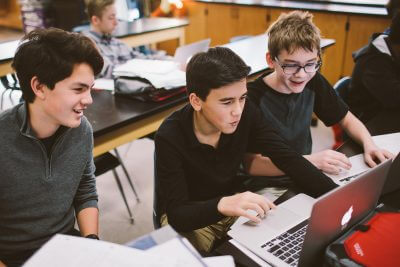February 7, 2017
 On January 11 at MPA Talks, MPA parent and Director and Professor of the University of Minnesota School of Music, Dr. Michael Kim, presented “Creativity and the Fine and Liberal Arts in the 21st Century” to the Mounds Park Academy community. See below for a thoughtful Q&A with him, based on the same topic.
On January 11 at MPA Talks, MPA parent and Director and Professor of the University of Minnesota School of Music, Dr. Michael Kim, presented “Creativity and the Fine and Liberal Arts in the 21st Century” to the Mounds Park Academy community. See below for a thoughtful Q&A with him, based on the same topic.
In schools today, there is a strong emphasis on STEM education. Why is it important to focus on STEAM instead, as Mounds Park Academy does?
Today in our schools and in our public discourse, we are increasingly focused on the importance of students developing skills in and experience with science, technology, engineering, and mathematics or STEM. Indeed, technology is now a major part of our society, and technological advancements have progressed rapidly.
Given the pace and pervasiveness of technology-driven changes, however, some of the most important skills for students to acquire are flexibility and adaptability. Our children will need to adjust to ever-changing times and possess qualities and skills that are the focus of a strong liberal arts education. So we really need to focus on STEAM (science, technology, engineering, arts, mathematics), not just STEM, as is the case at MPA.
My family and I love the focus on creativity at MPA and that the school engages students in the visual and performing arts at every academic level. As an educator myself, I believe it’s not enough to just foster an appreciation for the arts. But rather to guide students in developing their own artistic skills and to provide opportunities for them to explore, create, and express their ideas through art, performance, and music.
Why is a liberal arts education so important in our technology-driven world?
We live in an age where computers and technology can complete critical functions better, faster, and cheaper in all areas of life. We even have robotic nurses that can help diagnose and treat patients. So how do we stay relevant in a world where even business magnate, engineer, and inventor Elon Musk calls artificial intelligence our biggest existential threat? I believe that is by focusing on creativity, empathy, and the qualities that define our humanity; qualities, skills, and insights developed through the liberal arts and integrating the arts wherever possible in a cross-disciplinary way, as they do at MPA.
Technology and artificial intelligence will never have intelligence of the heart and human experience. CNN host Fareed Zakaria host has said, “The future of a country like the U.S. rests on our ability to master how technology interacts with how humans live, work, and play…and that depends on skills fostered by the liberal arts, such as creativity, aesthetic sensibility, and social, political, and psychological insight.” Steve Jobs, too, said, “It’s in Apple’s DNA that technology alone is not enough—it’s technology married with liberal arts, married with the humanities, that yields the results that make our heart sing.”
 Employability is critical, so what qualities are employers looking for and how does a STEAM education help?
Employability is critical, so what qualities are employers looking for and how does a STEAM education help?
To make a short list in just about any field, candidates must possess the qualifications for the position—the requisite degree, concrete skills, and necessary experience. The differentiators, however, are more intangible. Employers are looking for character, dependability, reliability, a willingness to learn, and a positive and collegial attitude. They want employees who are team players, self-motivated, and critical thinkers. Employers want to hire graduates who are passionate, and that’s a quality that’s hard to fake. As a Mounds Park Academy parent, I am delighted that these are the exact qualities that the school is fostering in its students, in addition to deep content knowledge and experience in the STEM disciplines and the liberal arts. I love my child, but I want to make sure he’s employable and not living in my basement someday!
So just how employable are liberal arts graduates?
In his address, “The Road Ahead: A Call to Action,” Dean John Coleman of the College of Liberal Arts at the University of Minnesota, Twin Cities, asserts that “…liberal arts students are well positioned for careers throughout the economy. The liberal arts at their best promote an entrepreneurial mindset in students—inventive, risk-taking, questioning, innovative, and analytical. There is heavy representation of liberal arts graduates throughout the leadership of Fortune 500 companies as well as leadership in government, health care, the tech sector, law, education, small business, and nonprofits, which tells us something important about the opportunity provided by a liberal arts education.”
What are some of your favorite examples of liberal arts graduates in unexpected fields?
Nono Ohga, the chairman and CEO of Sony during the 1980s, was an opera singer before he started his career with the venerable Japanese company. According to his obituary in The New York Times, Ohga was “the principal architect of Sony’s move beyond its stronghold of sleek consumer electronics gear and into music and movies.” He was very clear that design was the differentiator, famously noting that “At Sony we assume all products of our competition will have basically the same technology, price, performance and features. Design is the only thing that differentiates one product from another in the market place.”
Few people know that Alan Greenspan was a clarinet major at Juilliard. He was an advisor to several presidents before his 1987 appointment as chairman of the Federal Reserve Board by Ronald Reagan. Greenspan remained in that position until 2006, and through his leadership shaped U.S. monetary policies for 20 years. Speaking of Juilliard, famous cellist Yo-Yo Ma does not have a music degree from my alma mater. When he auditioned there, the cello professor at the time told Ma that there was nothing more to teach him and that he should go elsewhere. So the cello prodigy studied French Literature at Harvard.
Creativity is central to the Mounds Park Academy experience. If this is what you are seeking for your child, learn more about our admission process and request information today! We’d love to get to know your family!